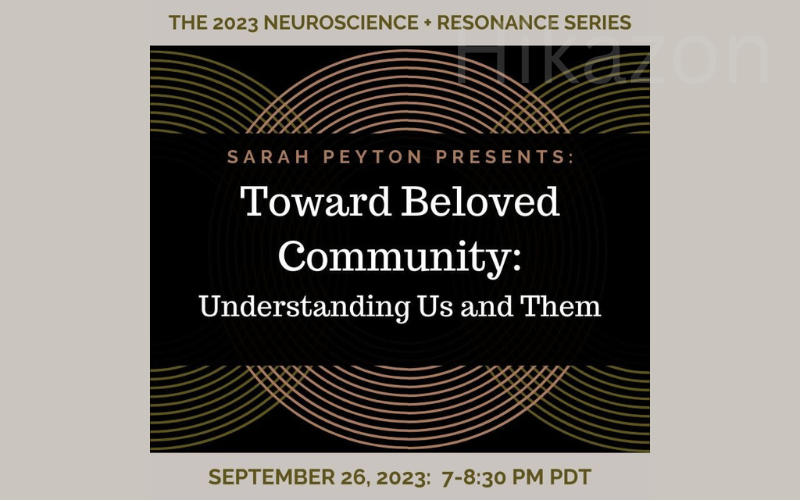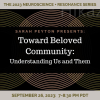Toward Beloved Community: Understanding Us and Them By Sarah Peyton
$20.00 $8.00
Toward Beloved Community: Understanding Us and Them By Sarah Peyton – Digital Download!
Content Proof:
Toward Beloved Community: Understanding Us and Them
In a world rife with division and polarization, the challenge of fostering connection and understanding among individuals is more pertinent than ever. Sarah Peyton, in her work “Toward Beloved Community: Understanding Us and Them,” delves into the intricate workings of the human brain and how our neural processes influence our social interactions. Through a profound 90-minute webinar, Peyton effectively unfolds the mechanisms underpinning our tendency to categorize others into “us” versus “them,” along with practical insights for fostering connection and compassion. This exploration resonates deeply with concepts of equity and inclusion, echoing the sentiments articulated by visionary figures like Martin Luther King Jr., who called for a society embraced in love and grounded in justice. By examining the neurobiological roots of our social behaviors, Peyton empowers participants to engage in self-reflection and ultimately seek the development of a “beloved community” where empathy prevails.
The Neurobiological Underpinnings of Division
The brain is an intricate and fascinating organ, operating on a complex web of connections that dictate how we perceive and relate to one another. According to neuroscience, when individuals categorize others into in-groups or out-groups, their brains react in ways that can trigger feelings of safety or threat. This could often be perceived as a survival instinct, ingrained in our evolutionary history. The amygdala, which is responsible for processing emotions, can become hyperactive when individuals feel their group is under threat, amplifying biases and fears toward those perceived as outsiders.
Peyton draws attention to this response and suggests that understanding these neurobiological reactions is vital for fostering a more compassionate society. Participants in her webinar are encouraged to reflect on their experiences and examine how their self-talk and cognitive patterns shape their perceptions of others. The transformations begin with mindfully recognizing these responses, allowing for greater awareness and intentionality in their interactions. Here, Peyton aspires to cultivate a deeper understanding of the biases we hold and how they impact our relationship with the world around us.
Research underscores the importance of this awareness. Studies indicate that when individuals engage in empathetic self-talk, they are not only better able to understand others’ experiences but also enhance their own emotional regulation. For instance, a groundbreaking study published in The Journal of Neuroscience demonstrates that practicing self-compassion can activate neural circuits associated with care, thereby disrupting negative bias patterns.
Exercises and Tools for Enhancing Compassion
To facilitate a transformation in how individuals perceive and interact with one another, Sarah Peyton provides a variety of practical exercises during her webinar. These exercises are designed to guide participants through the process of introspection and self-discovery. Engaging in guided meditations, participants learn to cultivate their empathetic capacities and shift their focus from judgment to understanding.
A few notable exercises include:
- Reflective Journaling: Participants are encouraged to document instances where they felt divided from others. By laying bare the thoughts and emotions surrounding those moments, they can explore underlying biases and question their validity.
- Empathy Mapping: This visualization technique allows participants to chart their perceptions of different groups, identifying potential prejudices. Following this exercise, they are prompted to consider the subjective experiences of members from those groups, fostering deeper understanding.
- Active Listening Simulations: These simulations create scenarios in which participants can practice truly listening to one another without judgment or interruption, facilitating authentic connections and collaborative dialogue.
Through these practical, engaging tools, Peyton enables participants to dissect complicated social dynamics, helping them identify how biases surface in their daily interactions. With each exercise, the aim is not only to foster personal growth but to contribute to a broader ethos of social justice and community healing.
The Vision of a Beloved Community
At the heart of Peyton’s work is the vision of a “beloved community,” a term made popular by Martin Luther King Jr., which encapsulates an ideal society based on love, justice, and inclusion. In the webinar, Peyton articulates the need for radical acceptance an approach that signifies embracing differences and working through conflicts rather than avoiding or suppressing them.
This concept can be compared to a garden where diverse plants thrive together. Each species has unique needs and characteristics, yet when nurtured in a shared environment, they contribute to a vibrant ecosystem. Similarly, the beloved community necessitates acceptance that allows for diverse identities and backgrounds to coexist harmoniously, fostering an atmosphere where mutual respect and genuine connection can flourish.
Crucially, building this kind of community requires vulnerability and a commitment to dialogue. In a society often characterized by polarization and misunderstanding, the willingness to engage in difficult conversations becomes paramount. Participants learn that by confronting themes of division and tension, they can usher in healing processes that restore trust and connectivity.
Engaging with Broader Contexts
Peyton emphasizes that understanding the dynamics of “us versus them” is not merely an individual journey it is inherently linked to broader societal contexts. Structural inequalities and historical injustices create landscapes where division thrives. Therefore, fostering a sense of beloved community also necessitates a critical examination of these contexts and the courage to address them.
The course encourages participants to reflect on systemic biases entrenched within societies, acknowledging the effects of privilege and oppression. As a practical application, Peyton guides participants to consider actions they can take within their communities to address these disparities, be it through advocacy, allyship, or active participation in social justice initiatives.
To illustrate this point, here’s a concise list of steps individuals can take to contribute to a beloved community:
- Educate Others: Share insights from the webinar with community members to promote understanding of neurobiological responses and the importance of acceptance.
- Advocate for Inclusion: Support local policies that foster equitable access to opportunities for marginalized groups.
- Participate in Community Dialogues: Engage in or organize discussions focused on addressing division and promoting unity.
- Volunteer for Social Justice Organizations: Actively contribute to efforts aiming to dismantle systemic barriers that perpetuate inequality.
Engaging in collective action fosters an environment where people feel empowered to contribute to the pursuit of justice, allowing diverse communities to thrive in shared spaces.
Conclusion
In summary, “Toward Beloved Community: Understanding Us and Them” by Sarah Peyton is a comprehensive endeavor that effectively merges theories from neuroscience with practical strategies aimed at fostering compassion and connection in an often fractured society. By equipping participants with tools for self-reflection and offering deep insights into the mechanisms of bias and division, the course advocates for a path toward radically accepting one another.
Peyton’s focus on the beloved community serves as a powerful reminder that the pursuit of an inclusive society requires continual effort, awareness, and action. As individuals embark on their journeys, they carry the responsibility to break down barriers, confront biases, and nurture connections that transcend differences. In a time of looming division, the work urges us to embrace a vision of love, justice, and healing an invitation to join hands in building a cherished community where we all belong.
Frequently Asked Questions:
Business Model Innovation: We use a group buying approach that enables users to split expenses and get discounted access to well-liked courses.
Despite worries regarding distribution strategies from content creators, this strategy helps people with low incomes.
Legal Aspects to Take into Account: Our operations’ legality entails several intricate considerations.
There are no explicit resale restrictions mentioned at the time of purchase, even though we do not have the course developers’ express consent to redistribute their content.
This uncertainty gives us the chance to offer reasonably priced instructional materials.
Quality Assurance: We guarantee that every course resource you buy is exactly the same as what the authors themselves are offering.
It’s crucial to realize, nevertheless, that we are not authorized suppliers. Therefore, the following are not included in our offerings:
– Live coaching sessions or calls with the course author.
– Entry to groups or portals that are only available to authors.
– Participation in closed forums.
– Straightforward email assistance from the writer or their group.
Our goal is to lower the barrier to education by providing these courses on our own, without the official channels’ premium services. We value your comprehension of our distinct methodology.
Be the first to review “Toward Beloved Community: Understanding Us and Them By Sarah Peyton” Cancel reply
You must be logged in to post a review.
Related products
Psychology
Juicy Relational Skills for Emergence 2023 (The Full 3-Part Online Series) By Sarah Peyton


















Reviews
There are no reviews yet.